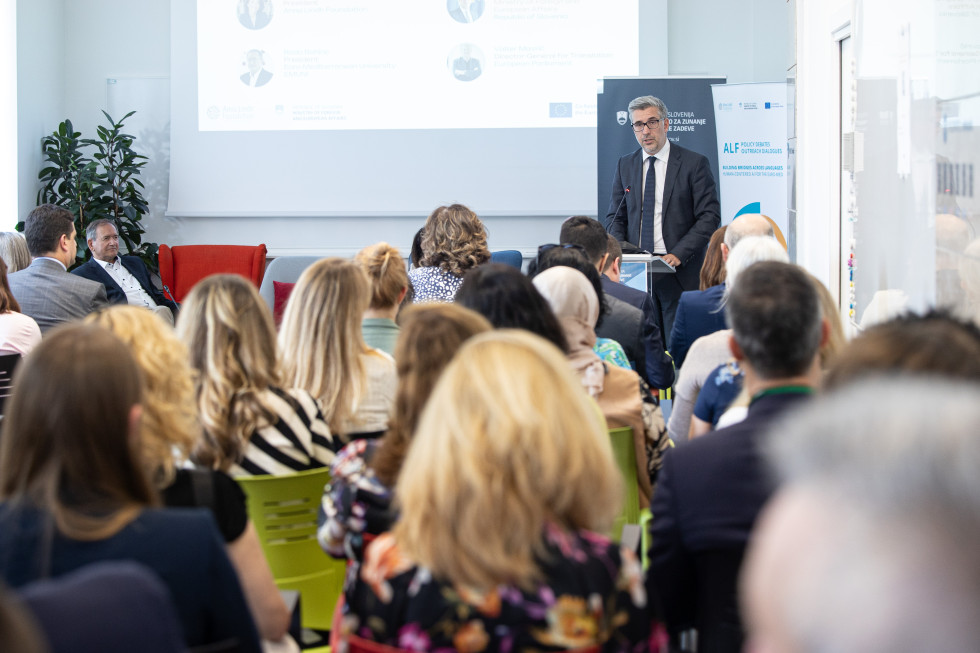Building Bridges Across Languages: Human-Centred AI International Conference
In his opening address, State Secretary Marko Štucin emphasised that the use of AI in translation can help to share knowledge and ideas, which is crucial for resolving conflicts and improving mutual understanding. "Slovenia promotes a human-centred approach to AI in translation in the Euro-Mediterranean region. As AI continues to advance, we must ensure that the role of humans in the translation process evolves rather than diminishes.”
Experts and participants, including Princess Rym Ali of Jordan, President of the Anna Lindh Foundation, agreed that translation is important in promoting intercultural dialogue and fostering a common identity based on cultural diversity among Euro-Mediterranean societies, and that as AI gets better and better at processing and generating natural/human language, the ethical implications of its use in translation need to be addressed. The participants referred to the results of studies showing a lack of translation in the Euro-Mediterranean area and a highly unbalanced and asymmetrical exchange between languages. The emergence of AI, which can be an important tool and help with understanding and translation, has brought about a major change in the field of translation. As an ever-evolving technology, AI is playing an important role in reshaping the communications landscape in the Euro-Mediterranean region and the world at large.
The potential of intercultural dialogue between people and countries is of paramount importance, especially in the current difficult times in the Euro-Mediterranean area. It is also a prerequisite for building a culture of peace that will benefit the entire region and contribute to bridging the gaps in understanding different backgrounds and contexts, which is the core mission of the two co-organisers of this event. Slovenia and the Anna Lindh Foundation have a long history of successful and productive cooperation. In this context, State Secretary Štucin recalled the organisation of the 2016 Translation for Dialogue conference, which marked a significant milestone in bringing together individuals dedicated to presenting, debating and advocating translation as an important tool for intercultural dialogue.
The technological progress can foster deeper intercultural understanding and trust, and strengthen ties in the Euro-Mediterranean region. These unprecedented advances must be approached with caution and awareness of the technical, social, ethical and political challenges they pose. AI has the potential to deliver societal benefits. However, its integration into our daily lives requires a thoughtful and responsible approach. Slovenia is particularly committed to transparent, ethical and trustworthy AI and underlines the importance of these principles to realise its full potential.
Integration and cooperation are key to the sustainable development of the region, which is why it is essential to create platforms and opportunities for dialogue that transcend language and cultural barriers. The integration of AI into translation can support economic growth by facilitating trade and business communication across different languages, opening up new markets and opportunities for entrepreneurs and businesses, and stimulating innovation and economic development.
The conference, which ends tomorrow, 7 June, has brought together a number of experts, including Valter Mavrič, Director-General for Translation, European Parliament, Rado Bohinc, EMUNI President, Josep Ferré, Executive Director of the Anna Lindh Foundation, Ildikó Horváth, Director of the Translation Centre for the Bodies of the EU, Boštjan Zupančič, Head of the Translation Service at the Ministry of Foreign and European Affairs of the Republic of Slovenia, Mitja Jermol, UNESCO Chair on Open Technologies for Open Educational Resources and Open Education, IRCAI, Davor Orlič, COO, International Research Centre on AI under the auspices of UNESCO (IRCAI), Naully Nicolas, Vice-Chairman, Scientific Committee, Agence Francophone Intelligence Artificielle, Karim Bouzoubaa, Full Professor, Mohammed V University, Rabat.


